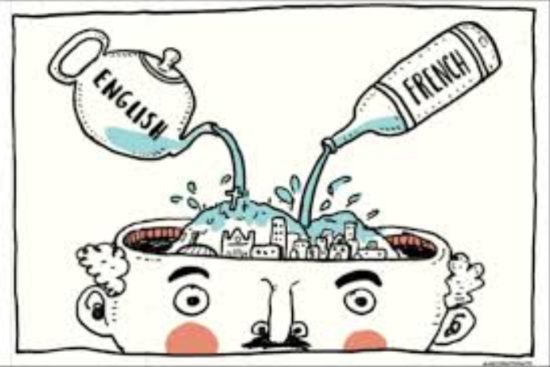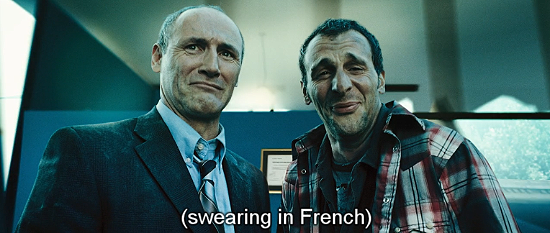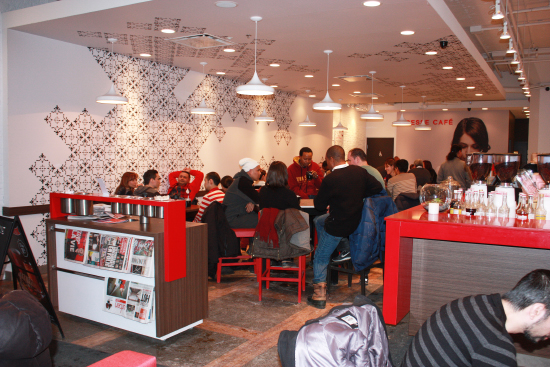Bon Cop, Bad Cop is a 2006 bilingual Canadian R-rated buddy cop film from Alliance Atlantis Vivafilm starring Canadian actors Patrick Huard and Colm Feore. Directed by French-Canadian Eric Canuel and shot totally in Canada, Bon Cop, Bad Cop boasts Canadian humour, locations, and references. With the plot set in both Ontario and Quebec, the film divides its lines between French and English, sometimes rapidly switching between the two mid-line. Subtitles were supplied for separate Anglophone and Francophone versions on release, making the movie accessible to all audiences. While some jokes fall flat as the tone of the movie wears on in the last act, overall Bon Cop, Bad Cop is an enjoyable (if raunchy) watch.
March 2015 Archives
Language has long been a contentious subject of debate in Quebec. Since the earliest days of British colonization, French Canadians have fervently resisted assimilation into the anglophone majority, which eventually gave birth to the nation's defining policy of official bilingualism whereby English and French have equal status in Canada. Despite the federal government's efforts to satisfy the linguistic needs of every citizen, the Quebec government saw it necessary to protect the language rights of Quebecers, as well as the integrity of the language itself. One such safeguard was establishing the Office québécois de la langue française which, over the years, has gained notoriety due to its perceived overzealous enforcement of Bill 101. The prevalence of such incidents has led many nowadays to believe that the OQLF has outlived its usefulness and relevance. To determine the reality of this attitude, the factors that gave rise to the Office must be weighed against its present role in Quebec society.
 Image Source: http://www.montrealgazette.com/news/frenglish/passion+local+language+Meet+some+people+have+become/7591482/story.html
Image Source: http://www.montrealgazette.com/news/frenglish/passion+local+language+Meet+some+people+have+become/7591482/story.html
The evolvement of translation in Montreal has an intriguing history, featuring some amusing anecdotes pertaining to the evolution of the city`s first "dragomans". And it is important to note that being bilingual is not at all equivalent to being a quality translator; nor is it necessarily conducive to it, especially in the context of Montreal.
Put simply, when two languages overlap as much as English and French do in Montreal, there is plenty of room for such insidious things as calques, anglicisms and gallicisms (to name but a few) to creep in and yield negative impact on the quality of a translation. The usage of certain terms is always a bone of contention among language practitioners. For example, some of the first famous French-Canadian translators and interpreters would often "accuse" each other of using random anglicisms! That, however, did not at all mean that some of them were less professional than others; rather, it is testimony to the presence of a continuous anglo-franco fusion dating back to the dawn of the translation industry in Montreal.
By Alix Fraser
Visit any of Montreal's bustling markets and you'll hear a rich mix of languages unlike nearly anywhere else in Canada. Citizens of the city often boast bi- and trilingual knowledge, slipping in and out of their languages with ease. For monolingual residents, be they new Anglophone students, immigrants, young Francophones, or otherwise, the multilingual climate can be intimidating.
Though formal classes are offered at schools and centres all over the city, the best way to learn a new language is with hands-on experience. In a multilingual climate like Montreal's, all is not lost for those of us seemingly stuck in our monolingual funk. Learning a second language is an invaluable asset in today's connected world.
There are dozens of groups created for the sole purpose of giving new language learners a chance to practice their skills and stretch their conversational skills. The biggest practice group in Montreal is Le MEETUP de conversation Français-Anglais, boasting more than 6,380 members and over eight years of history.



Recent Comments